What is Contract Management - Everything You Need to Know
24:59
This website stores cookies on your computer. These cookies are used to improve your website and to provide more personlised services to you, both on this website and through other media.
To find out more about the cookies we use see our Privacy Policy.










Contract Management, Contract Lifecycle, CLM, Contract Lifecycle Management, Compliance, Visibility, Control
Ian BryceFeb 11, 2025 5:15:00 PM
Contract lifecycle management (CLM) is the process of overseeing legally binding agreements from creation to execution, monitoring, and renewal.
It ensures that all parties adhere to their contractual obligations while minimising risks and maximising value. Effective contract management aligns agreements with business goals, enhances compliance, and improves operational efficiency.
Traditionally, contract management has been a labour-intensive process, requiring extensive manual tracking, navigating fragmented systems and high levels of administrative work. By using an optimised and automated approach, supported by AI-powered contract lifecycle management software, your organisations can restore visibility into agreements, take back control of contract processes, and safeguard compliance against legal and regulatory risk.
In this article, we answer the following questions:
How your business manages its contracts - from the systems it uses to how teams work together - will ultimately influence its levels of contract visibility, control and compliance.
The strength of these pillars will determine your business’s overall success - so your people, processes and technology need to be built with this in mind,
Contract lifecycle management (CLM) is important because how you handle your agreements end-to-end will influence the outcomes of the agreements.
The process of CLM is designed to help businesses extract maximum value from contracts while remaining compliant with regulations and staying in control of relationships with third parties.
Effective contract management can be characterised by the phrase “No Surprises”. When done right, everyone knows what and when things are expected of them. Your business can see what’s on the horizon, it can prepare confidently for any audits and it can demonstrate compliance at any given time."Building standardised and collaborative contract management processes is important because it gets all stakeholders working in the same way.
Your business can expect to achieve its negotiated outcomes - as well as find opportunities to strengthen its position.
You can read more about the importance of contract management by downloading this free ebook, which contains 38 pages of free industry insight:
The contract lifecycle can broken down into seven high-level stages, which are:
You can see how they fit together in the following diagram:
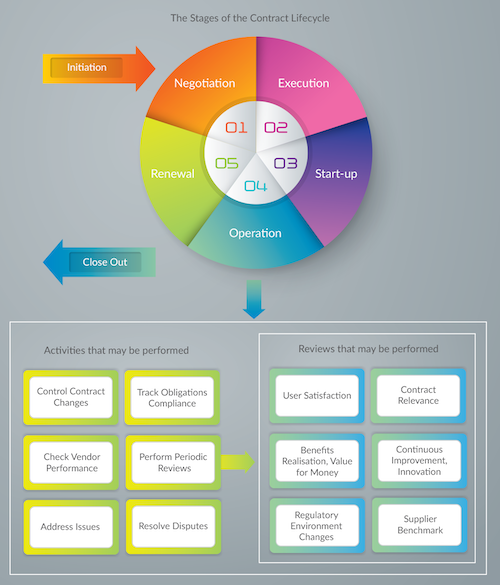
You might also see the stages of the lifecycle grouped into two main areas:
However, focusing on the 7 stages, they each represent an opportunity for a business to maximise the value realised from its contracts and to protect its interests.
Applying relevant contract management principles and practices throughout the contract lifecycle will create opportunities to restore visibility, take back control, safeguard compliance.
This will allow you to create more meaningful relationships with your contracted vendors.
When a need for a new product, service or partner becomes apparent, having a clear process to follow for everyone is vital. Now’s the time to capture the requirements, details of potential partners and to agree sign-off parties.
It’s surprising how often these completely controllable details are either not recorded accurately or not covered in enough detail. Getting them right makes the rest of the process much more straightforward."
Selected CLM actions at this stage:
A lot of focus for contract managers is on cost reduction and control. However, it’s vital that both parties are happy with the outcome and one party doesn’t feel that they’re at a disadvantage.
At this stage, good CLM ensures a mutually beneficial agreement is reached that is rewarding but attainable on all sides.Selected CLM actions at this stage include:
Once an agreement has been reached, the documents must be signed by the relevant parties. Finalised documents, with all agreed changes, have to be produced and shared with key stakeholders.
Selected CLM actions at this stage:
In this foundational stage, key contract metadata must be extracted and added to the central contract register. This stage can easily be overlooked if there's a rush to get the contract up and running. This can lead to significant problems further down the line.
Selected CLM actions at this stage:
Regular check-ins and ongoing contract performance monitoring are needed to ensure targets and milestones are met, particularly in terms of spend and revenue. Contract monitoring can also help businesses to ensure that compliance is always maintained - especially in a world where regulation can quickly change.
Both parties must ensure they comply with their contractual obligations, with the supplier delivering what’s been ordered or agreed."
Selected CLM actions at this stage:
Contract renewals offer a massive opportunity for cost control & reduction, negotiating better terms and deepening relationships with suppliers. However, it’s opportunity that’s all too often squandered due to poor contract management processes.
How often do we make a note of when the renewal date is to trigger a discussion about value received and whether the contract should continue? Too often, businesses fail to get the most from their contract renewals.
It’s all too easy to forget to do this and, before you know it, the renewal dates have come and gone and you’re committed for a further year (or longer) whether you like it or not."On the flip side, and with potentially equally damaging consequences, are auto-terminating agreements.
If you have a business-critical contract that has an auto-terminate clause, you may find your business at risk of failure if a particular service or system is no longer accessible.
Having a clear line of sight into all contract renewals is vital for generating the necessary value from these agreements and for minimising risk.
Inputting the data somewhere it can be accessed easily, setting reminders and establishing who is responsible for reviewing the contract must be the key priorities.
Selected contract lifecycle management actions at this stage:
Again, it can be easy to skip this stage because of competing priorities. If you’re no longer working with a contracted party, it can be tempting to ignore any remaining processes and move on.
However, you can never know what information and records might need to be available in the future.
Compliance requirements can change, audits of previous activities can occur and information that you previously thought irrelevant can become vitally important.
This is why it's imperative to close out contracts appropriately.
Selected CLM actions at this stage:
Let's talk about how CLM fits into the wider world of managing your business's contracts and vendors. At Gatekeeper, we understand that managing contracts in a silo won’t lead to the best business outcomes.
CLM is a part of a bigger strategy that includes Vendor Lifecycle Management and Third-Party Risk Management (TPRM). And in this holistic approach we call Vendor and Contract Lifecycle Management. CLM is a key player but it's not the whole game.
By looking at all these aspects together, your business can make smarter decisions based on total visibility, streamline its processes and manage risks better.
Integrating CLM with VLM and TPRM in a cohesive way helps break down silos between different teams. It allows for a more streamlined, efficient process, giving everyone a clearer picture and better control over vendor relationships and contract management.
A business that carries out effective contract management processes has total visibility of its portfolio and a single source of truth.
It knows which obligations have been fulfilled and which still need to be completed.
It understands the current levels of risk, spend and performance across each of its contracts.
When any of these areas aren’t performing as expected, stakeholders can trigger mitigation strategies to ensure compliance is safeguarded and outcomes are always delivered upon.
If your business is currently managing contracts via Excel or through a combination of sheets, shared drives and emails, it will struggle to reach the vision outlined above.
Effective contract management is defined by:
With this in mind, businesses need to focus on aligning their people, processes and technology around managing contracts in order to release the full value contained in them.
Any solution used to manage contracts - whether that’s Excel or dedicated VCLM software - is only as good as the people and processes feeding into it. As you’ll see here, best practices are achieved when everyone follows a clearly defined way of working that's shared across the entire organisation.
If the only copy of a particular business contract sits in a filing cabinet in a remote office, then there’s no opportunity for that to be monitored effectively. Expected benefits can’t be measured against those delivered, key dates can’t be extracted and business risk can’t be assessed.
Creating a single source of truth via a contract repository and maximising the visibility of your business’s entire portfolio allows stakeholders to apply a coherent strategy to its agreements.
A contract may need reviewing ahead of renewal, vendor information may need updating or an internal discussion may be required to improve overall performance.
Unless you can see these issues, your business won't be able to proactively address potential issues and is at risk of not realising the full value of its agreements.
Best practice contract management allows you to see all contracts in one place, with AI-powered contract summaries and clause insights to surface key information instantly.
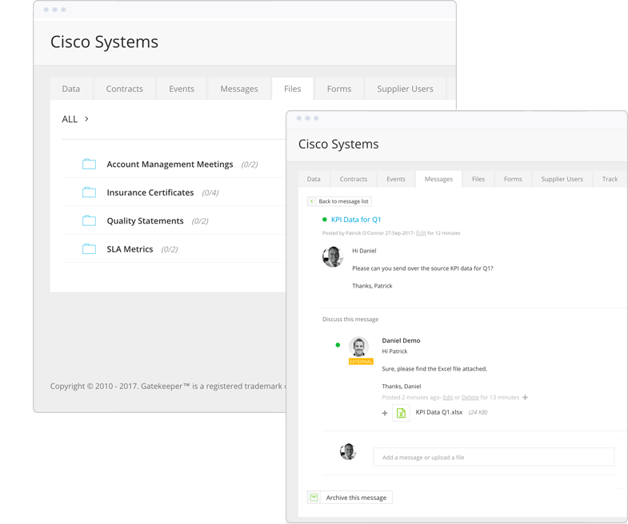
When businesses start to implement contract management processes, they often prioritise the needs of the Legal team. More often than not, this team is responsible for the day-to-day handling of agreements.
But contract management processes become most effective when all areas of an organisation are bought in and responsibility isn’t concentrated in a single department.
Collaboration across Legal, Procurement, Risk, Compliance and IT doesn’t just mean sharing information. It also means knowing who is responsible for which party of a contract’s lifecycle, what actions have been carried out and what there is left to do.
It means shared workloads, shared responsibility and key stakeholders not being caught in bottlenecks caused by administrative tasks or poor communication.
Taking back control requires businesses to clearly define internal processes, assign owners and hold stakeholders accountable for the outcomes of all agreements. The overworked Legal team is a regular symptom of businesses where contract management is more of an afterthought than a core practice.
Contract management best practices that allow your business to take back control include:
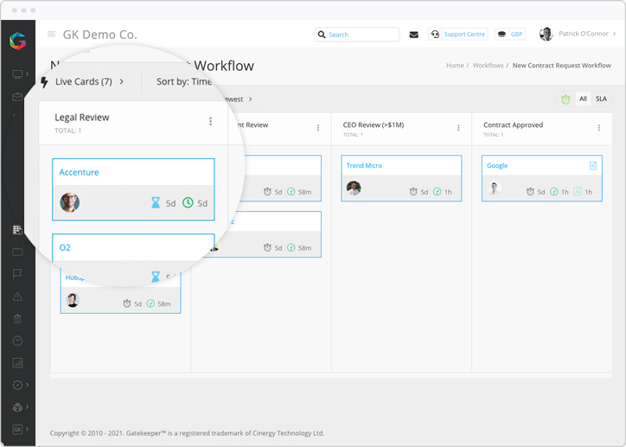
The best systems still require auditing and checking to make sure that everything is running as intended. Spot-checking individual contract records periodically from different areas of the business will give you an insight into the robustness of your process. The context of these spot checks is likely to change as regulation continues to evolve over the coming years.
Check to see if records have complete metadata, whether contract terms and obligations are being monitored and if relevant compliance certifications are up to date.This task sounds simple - but it can quickly become unworkable as contract volumes grow and the team doesn’t scale at the same pace.
If a contract owner leaves the business and nobody else picks up the monitoring, the lack of sufficient handover can leave your business exposed to contract risk and non-compliance.
Investing in contract management software transforms this manual, time-consuming activity. Instead, it captures every action taken against a contract and provides a time stamp, a name and the date it occurred.
Having this complete history of actions doesn’t just help with business continuity, it also helps you to prove compliance and controls to auditors.
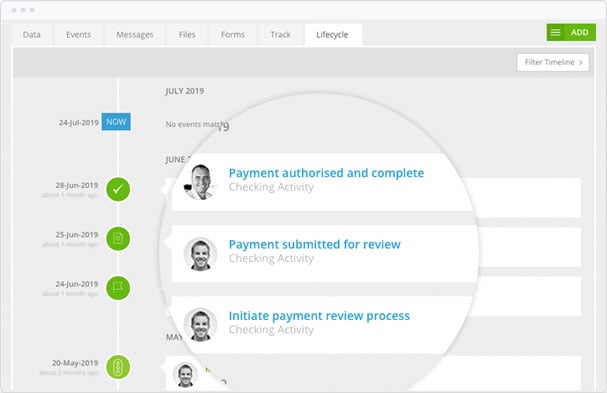 See a complete and defensible history of all actions taken
See a complete and defensible history of all actions taken
If you fail to establish whose responsibility it is to approach suppliers at the time of renewal for an appraisal, you can be left with an “Oh, I thought you were doing it” moment that leaves everyone looking unprepared.
If your business is using fragmented processes to manage its contracts, it may not be clear who is responsible for the future of your agreements.
Too often, renewals come and go without anyone realising and businesses find themselves locked into year-long agreements that are no longer required."Using CLM software to automate the renewal process can help to ensure that consistency is achieved. A typical workflow could include identifying the contract end date and notice period and then automatically calculating the date when notice would need to be provided.
Using that date, an internal process could be triggered for a set time before so that an internal review by the relevant parties could be conducted and a reasoned decision reached about whether to renew.
Accountability can really be driven home with the use of automated notifications, reminding the owner that a renewal is on the horizon to proactively review the value achieved from the existing agreement.
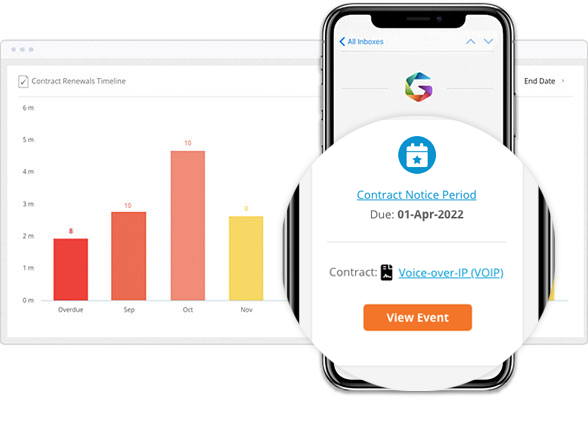 Gatekeeper's Renewal Notifications
Gatekeeper's Renewal Notifications
New approaches to contract management - processes or technology - need to align with what users want and how they currently work. If teams are already using a specific tech stack, your new solution or way of working needs to work alongside what’s already in place, rather than replace them.
If you introduce new contract management processes or a CLM system with little buy-in, don't expect to achieve success straight away.
Learning a new way of working makes life harder for stakeholders. They may be tempted to find workarounds, and stay in their preferred solutions. This will only bury your contracts further in silos - making them difficult to locate and manage.
The biggest benefits of contract management software is that it automates your processes, reduces contract administration for overburdened teams and generally makes life easier for everyone. Continue to exploit this benefit by considering:
A solution that works alongside your current tech stack is better than a rip-and-replace approach. Remember that the entire organisation needs to be able to willingly adopt and use any new processes or solutions for contract management to be effective.
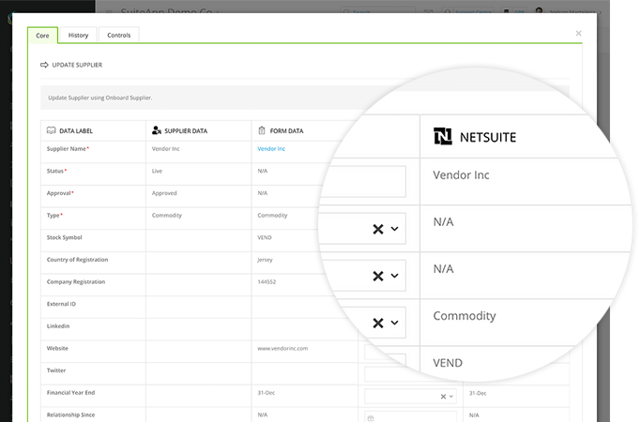 Use native integrations to improve your contract management processes
Use native integrations to improve your contract management processes
When contract management is manual, data security is compromised by the potential for human error. If your agreements are stored in a filing cabinet without lock and key, anyone in the office can access them.
It also means they can access confidential information. It's no different if contracts are kept in digital files that aren't password protected or on an unattended laptop that isn’t locked.
This leaves businesses exposed to data breaches. Sensitive information can be stolen. Entire agreements can be lost. Edits can be made without anyone else's knowledge. Each of these scenarios can result in business disruption and financial penalties.Data security should be a priority, especially in regulated industries. Having the right security in place will keep your business protected. And it will also help your business to pass any internal and external audits. Look for a solution that:
By giving data security the attention it requires, contract risk decreases. Each team and any third parties can have confidence in the data and all parties can work on a foundation of trust. Choose a contract management software provider that understands the importance of security.
As we’ve already alluded to, the technology you choose to manage your contracts with will be crucial to the success of your business.
With regards to choosing CLM software, make sure you consider things like:
We regularly hear from prospective customers that they’ve been looking to formalise their contract management and put a solution in place for a long period of time. If the number of legacy contracts your business has is proving to be a barrier to progress, then you need to address it sooner rather than later.
Your business will keep moving forward, more contracts will be signed and the size of the initial task to get those legacy agreements into your chosen solution will increase, making contract tracking more difficult.
More importantly, the accumulated benefits from those contracts are unlikely to be fully realised while they’re not being actively managed. The IACCM estimates that the cost of poor contract management can be as high as 9% of revenue.
If you think that a 9% bump in revenue would be beneficial for your business, then now’s the time to make progress – with the help of automation, visibility and AI from Gatekeeper.
Contract management is the approach you take to managing your agreements end-to-end. If your business is still using manual methods and fragmented systems to do so, it will struggle to succeed in business-critical areas such as visibility, control and compliance. Weaknesses in any of these areas will expose your business to risk and limit its ability to retrieve the full value of its agreements.
As a reminder, successful contract management looks like:
To help you understand the process of Contract Lifecycle Management better, don’t forget to download this free ebook. If you’re ready to take the next step in improving your contract management processes, speak to one of our experts to see where your business should start.

Ian writes on a variety of topics, bringing together his own knowledge and experience with that of industry experts.
Sign up today to receive the latest GateKeeper content in your inbox.

Copyright © 2015 - 2025. Gatekeeper™ is a registered trademark.
.png)
.png)
.png)
-4.png)
Before Gatekeeper, our contracts
Anastasiia Sergeeva, Legal Operations Manager, BlaBlaCar
were everywhere and nowhere.
Gatekeeper is that friendly tap on the shoulder,
Donna Roccoforte, Paralegal, Hakkasan Group
to remind me what needs our attention.
Great System. Vetted over 25 other systems
Randall S. Wood, Associate Corporate Counsel, Cricut
and Gatekeeper rose to the top.
Thank you for requesting your demo.
Next Step - Book a Call
Please book a convenient time for a quick call to discuss your requirements.